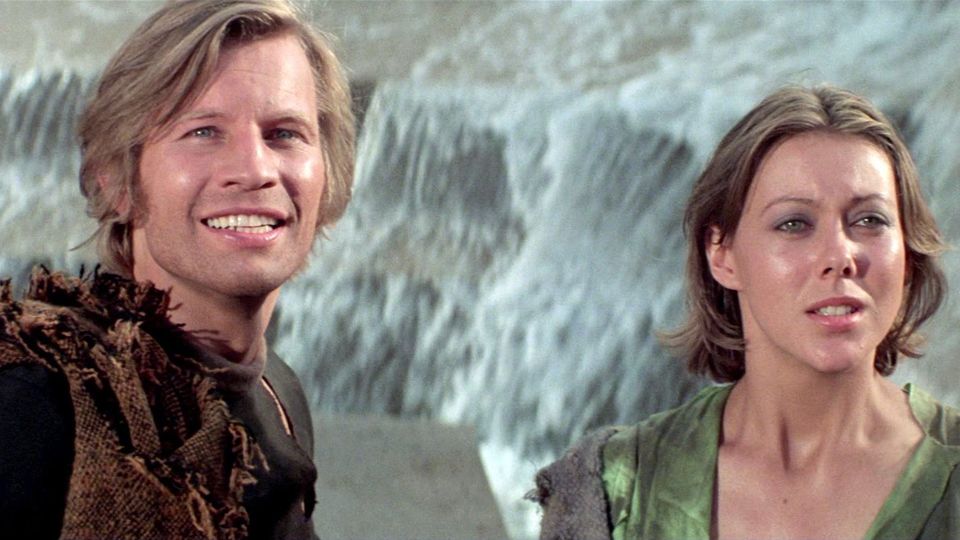
LOGAN’S RUN (1976)
IMDB Synopsis: An idyllic sci-fi future has one major drawback: life must end at the age of 30.
Director: Michael Anderson
Writers: David Zelag Goodman (screenplay by), William F. Nolan(based on the novel “Logan’s Run”)
Stars: Michael York, Jenny Agutter, Richard Jordan
The backstory to Logan’s Run is conveniently summarized in the title sequence shown in the first 30 seconds of the 2-hour film.
Sometime in the 23rd Century….the survivors of war, overpopulation and pollution are living in a great domed city, sealed away from the forgotten world outside. Here in a, ecologically balanced world, mankind lives only for pleasure, freed by the servo-mechanism which provide everything.
THERE’S JUST ONE CATCH:
Life must end at thirty unless reborn in the fiery ritual of carrousel.
Here we have another post-pollution apocalypse sci-fi flick – these were normal story-telling reactions to Federal Clean Water and Air Acts, Keep America Beautiful Campaigns and general visibility of Greenpeace in the 70s. If modern media was highlighting the cause of pollution, then it is normal for the science fiction of the time to fast-forward to the result of inaction. Logan’s Run, for its part, was saturated into a book, a movie and a tv series.
Post-Pollution films were to the 1970’s what nature strikes back films (waves, earthquakes, sharknados) are to the 2000’s.
At its heart, this post-pollution yarn is about a return to Eden. We know the corporate images (solo trees on hills, children blowing dead dandelions, close ups of cow’s faces, polar bears). Triteness and frequency work well together to stitch together a memorable story. These all represent a kind of dangerous nostalgia for a time that never really existed. Logan’s Run is another version of the same.
In Logan’s Run, overpopulation (a sustainability issue rarely addressed by common corporations as it runs contrary to their infinite market growth narratives, but perhaps the most pressing issue we have) is taken head on. Turn 30, get killed. It’s a strikingly simple solution – and totally sustainable. This math is in fact the formula for sustainability – 1:1. When corporations proclaim zero waste, that is the formula that are using. Zero waste assumes that the company disposes of as much waste as if it didn’t exist – so maybe 0:0 is the better formula, but it’s the same thing.
Of course a band of “misfits” try to escape the bureaucracy and domes and run, only to be tracked down and killed anyway by Sandmen – our hero Logan 5’s assigned profession. In a poorly executed plot twist, the faceless bureaucracy hiding behind the computerized (blameless) voice that seems to be running the show, Logan is ordered to infiltrate the misfits by pretending to be a runner.
Logan and Jessica (played by Jenny Agutter aka Nurse Alex Price from American Werewolf and London – and the best part of this movie) team up to escape and find the mythical “sanctuary” – a return to Eden, the outside, nature. It’s the same stuff that makes grown women and men want to hike the Appalachian Trail, and the same mythology that under pins corporate CSR storytelling.
Let’s fast forward through some of the slowest laser shootouts ever cap tured on film. Let’s also skip over Farah Faucet-Majors’ performance as if it never happened. Suffice it to say, Logan and Jenny escape through a sort of sewer system, into a cave where they need to strip down and clothe themselves in animal hides.
Adam and Eve say what?
They escape past one last slow robot appropriately named Box (Roscoe Lee Browne), and emerge – slimy from their adventures mind you! – through a slit in the cave. This shit is pregnant with rebirth symbolism.
Reborn, Logan and Jenny swim naked in vernal pools, explore an over grown Washington D.C. (the film’s version of Planet of the Apes’ Statue of Liberty moment) and eventually find their way to the hall’s of knowl edge complete with an Old Man (literally, that is his character’s name as played by Peter Ustinov). Confused by his age (and senility), they adopt him to join them on their journey to break back into the underground domes and set their people free.
Jump cut to success.
They do so, and as hordes of now free misfits climb out of the ground – entering the garden (the scene was shot at a water fixture called Ft. Worth Water Gardens) – they gather around Old Man with his white flow ing beard and tattered brown robes.
And we are once again reminded of the connection between sustainability and Religious iconographies (don’t get me started on the Ankh Jenny wears).